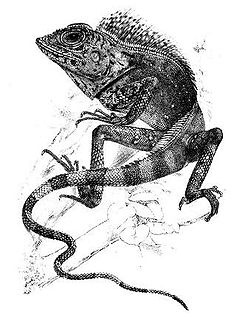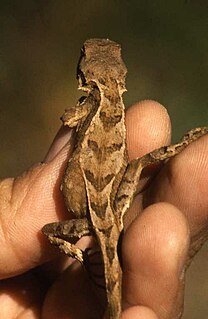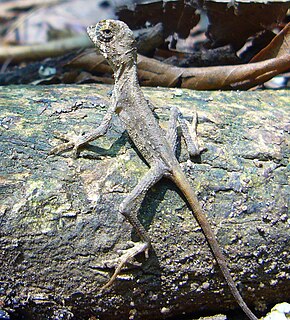
Agamidae is a family of over 300 species of iguanian lizards indigenous to Africa, Asia, Australia, and a few in Southern Europe. Many species are commonly called dragons or dragon lizards.

Calotes is a genus of lizards in the draconine clade of the family Agamidae. The genus contains 29 species. Some species are known as forest lizards, others as "bloodsuckers" due to their red heads, and yet others as garden lizards.

Draco is a genus of agamid lizards that are also known as flying lizards, flying dragons or gliding lizards. These lizards are capable of gliding flight via membranes that may be extended to create wings (patagia), formed by an enlarged set of ribs. They are arboreal insectivores.

Gonocephalus is a genus of agamid lizards endemic to southeast Asia.

Japalura is a genus of lizards in the family Agamidae. Species of Japalura are native to Pakistan, India, China, and Myanmar. Many species have been moved to the genus Diploderma.

Pseudocalotes is a genus of agamid lizards endemic to Southeast Asia.
Japalura andersoniana, Anderson's mountain lizard, is a species of lizard in the family Agamidae. The species is native to southern Asia.

Japalura tricarinata is a species of agamid lizard endemic to Asia.

Japalura austeniana, also known commonly as the Abor Hills agama or Annandale's dragon, is a rare species of lizard in the family Agamidae. The species is endemic to Asia.
Cnemaspis otai, also known commonly as Ota's day gecko or the Vellore day gecko, is a species of lizard in the family Gekkonidae. The species is endemic to southeastern India.

Otocryptis wiegmanni, commonly called the brown-patched kangaroo lizard, Sri Lankan kangaroo lizard or Wiegmann's agama, is a small, ground-dwelling agamid lizard endemic to Sri Lanka.

Diploderma swinhonis, also known commonly as the Taiwan japalure, Swinhoe's japalure, Swinhoe's lizard, and Swinhoe's tree lizard, is a species of lizard in the family Agamidae. The species is native to Taiwan. It is considered an invasive alien species in Japan after likely being transported from Taiwan by humans. A foraging ambush predator, this lizard preys primarily on arthropods and thus remains at the bottom of forests perched on trees where sunlight is present. Diploderma swinhonis is not a major threat to humans and is able to adapt to a variety of habitats, including urban environments. Male Diploderma swinhonis are physically distinct from females, with their body sizes being much larger and having a yellow stripe. These lizards sexually reproduce on a seasonal basis and hibernate during the winter time.

Diploderma polygonatum, also known as Ryukyu japalure and Okinawa tree lizard, is a species of lizard found in the Ryukyu Islands and Taiwan. It is diurnal and arboreal. An adult male Diploderma polygonatum measures "61 mm. from snout to vent, and 152 mm. from vent to tip of tail; total length 213 mm." The splenial of this lizard is short, as is that of Trapelus agilis. The lizard is also closely related to Diploderma swinhonis.
Diploderma luei is a species of lizard in the family Agamidae. The species is endemic to Taiwan.
Ota's bent-toed gecko is a species of lizard in the family Gekkonidae. The species is endemic to Vietnam.
Treutler's gecko is a species of lizard in the family Gekkonidae. The species is endemic to India.
Diploderma yulongense is a species of lizard found in the Yunnan province of China. It was first collected in 1914, but not recorded again in the wild until 2012, when it was described based on the original and new specimens.
Diploderma zhaoermii is a species of lizard in the family Agamidae. The species is endemic to Sichuan, China.
Cristidorsa is a genus of lizards in the family Agamidae native to India and Myanmar. The name Cristidorsa is Latin for "ridged dorsum", in reference to the ridges on the backs of lizards in this genus. The common name ridged dragons was suggested by the authors of the 2018 genus description. The species were originally placed in the genus Japalura.

Diploderma is a genus of lizards in the family Agamidae. Species of Diploderma are native to Myanmar, China, Vietnam, Taiwan, and Japan. Most of the species are found in China, including many endemics.











